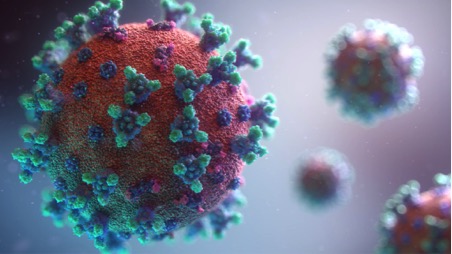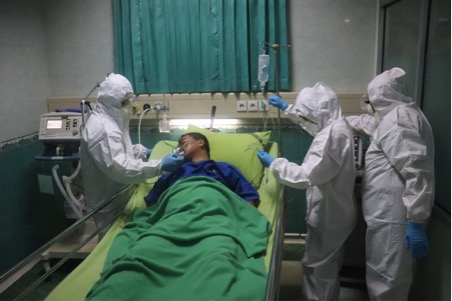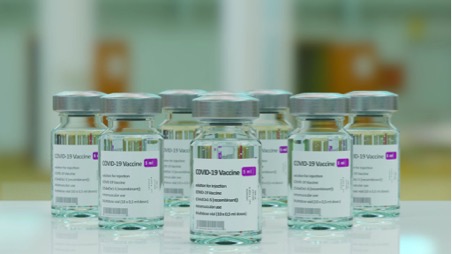A closer look at how COVID-19 is affecting your gut.

Aside from fever, dry cough, and shortness of breath, COVID-19 can’t give us a break! This virus also has other gastrointestinal symptoms that cause even more pain and distress.
We’re sure you all know by now what COVID-19 is, but we’re going to tell you anyway. Also known as Coronavirus, it is a respiratory disease that has been discovered in late 2019. According to WHO, COVID-19 is spread mainly by droplets passed on when an infected person coughs, sneezes, or exhales. These droplets are too heavy to float in the air, so they fall to the ground or other surfaces.
If you are close to someone with the virus, you can get infected by breathing them in or touching a contaminated surface and then touching your eyes, nose, or mouth. Those who catch it, most of them will have mild to moderate symptoms and recover without necessary treatment. In addition, if you’re under the age of 65 and don’t have any pre-existing medical issues, you are at a lower risk of developing severe complications.
The link between COVID-19 and gut-related issues?
Even though it is commonly seen as a respiratory condition, COVID-19 is also a gut-related virus. In fact, the virus that causes COVID-19, SARS-CoV-2, penetrates human cells by latching onto angiotensin-converting enzyme 2 (ACE2) protein receptors. The cells lining the gut contain the most significant amount of ACE2 receptors; it has 100 times more receptors for this enzyme than the respiratory tract. Therefore, patients with COVID-19 who have gastrointestinal symptoms are more prone to develop severe complications. This is partially due to the fact that the virus can linger in the gut of certain individuals for several days after it has been removed from the respiratory system. This results in a higher amount of virus and sickness that lasts longer.

What kind of symptoms are we talking about?
The most common COVID-19 symptoms are fatigue, fever, and dry cough. However, It's worth mentioning that gastrointestinal and abdominal affect a significant proportion of individuals. Research suggests that among the 138 patients, 10.1% had diarrhea and nausea at the outset. Some people may just have gastrointestinal problems and not develop any of the other symptoms. The symptoms include:
Diarrhea is a frequent symptom of COVID-19 infection. The American Journal of Gastroenterology released research that looked at 206 people who had a mild form of COVID-19. They discovered that 48 individuals solely experienced stomach symptoms, whereas another 69 had both digestive and respiratory issues. Diarrhea was the initial symptom for 19.4% of the 117 persons who had gastric distress. Some patients may have diarrhea but no other flu-like symptoms, such as a temperature. The virus might cause diarrhea as a first symptom; flu symptoms might appear after diarrhea in certain situations.
Vomiting is more prevalent in children with COVID-19 than in adults, according to Beijing's research. The researchers looked at all COVID-19 clinical studies and case reports published between December 2019 and February 2020 linked to digestive problems. They discovered that 3.6 to 15.9% of adults, compared to 6.5 to 66.7 percent of children, experienced vomiting.
Loss of appetite is another gastrointestinal symptom. Many who catch COVID-19 have a loss of appetite, which is frequently accompanied by other gastrointestinal problems. According to the same Beijing research, between 39.9% and 50.2 percent of persons suffer from a loss of appetite.
Other gastrointestinal signs and symptoms. COVID-19 patients have also experienced a variety of additional digestive problems. According to the Beijing study:
Nausea affects between 1% and 29.4%
Abdominal discomfort affects 2.2 to 6%
Gastrointestinal bleeding affects 4 to 13.7
What if I have these symptoms?
If you're experiencing new gastrointestinal problems and suspect you've come into touch with someone who has COVID-19, are experiencing other COVID-19 symptoms (fever, cough, shortness of breath, and sore throat), live in a “hotspot,” or work in high-risk occupations, you should definitely be tested.
Other than COVID-19, gastrointestinal symptoms such as diarrhea, lack of appetite, or nausea might occur in many other cases. Any of these symptoms may not necessarily indicate that you have COVID-19, but they could be early warning signals.
Seeing your doctor if you're concerned about any gastrointestinal problems is a good idea. Based on your medical history and risk profile, your doctor will give you a balanced assessment.
Seek medical help right away if your symptoms become more severe. The following are signs and symptoms of an emergency:
Bluish lips or face
Difficulty breathing discomfort
Pressure in the chest
Passing out or inability to wake
Acute abdominal pain vs. COVID-19 gastrointestinal symptoms
Acute abdominal discomfort, which is frequently accompanied by nausea, vomiting, diarrhea, and fever in medical facilities, is a severe clinical challenge for emergency physicians and surgeons. The differential diagnosis of acute abdominal pain has grown more complex in a particular pandemic condition like this. As previously stated, these symptoms can be the first clinical manifestation of COVID-19. Thus physicians should be highly cautious about admitting COVID-19 patients as patients with severe abdominal pain to a general hospital without stringent isolation precautions.
What strategies can physicians follow in this case?
Physicians will have to follow different strategies to properly diagnose and treat patients with acute abdominal pain or COVID-19. We suggest the following:
Physicians should thoroughly investigate the patient's medical history, particularly the epidemiological history. As you may know, COVID-19 has an incubation period of 1to14 days, with the most frequent time being 3–7 days. As a result, each patient with gastrointestinal symptoms should be asked if they have been exposed to suspected or confirmed cases of COVID-19 within the previous two weeks.
Physicians, particularly surgeons, should be familiar with the common symptoms of COVID-19 and the gastrointestinal and abdominal symptoms of the disease. By knowing that, they would be avoiding misdiagnosing COVID-19 as an acute abdomen and admitting patients to the general surgical ward, thereby contributing to the reduction of infections among inpatients and medical personnel.
Patients should have a thorough physical examination, particularly an abdominal examination. Specific pain locations may frequently be identified in postoperative acute abdominal pain; there are even indications of peritonitis, such as abdominal soreness, rebound discomfort, and abdominal muscular defense.
An appropriate auxiliary examination method, such as a blood test, viral pathogen detection, and imaging, should be conducted on patients.
To sum it up, doctors should be aware of the clinical characteristics of COVID-19, particularly the gastrointestinal and abdominal symptoms of the disease, during the present SARS-CoV-2 pandemic. All patients with acute abdominal pain should have a detailed epidemiological history taken, a thorough physical examination performed, and some reasonable auxiliary examination methods used to diagnose COVID-19 quickly so that timely preventive measures can be taken to prevent the virus from spreading.

It turns out I have COVID-19. What happens next?
If you’ve tested positive, you are infected with the virus. This means that you should worry about getting yourself better and avoid spreading it. Make sure to follow these guidelines:
Stay hydrated.
Avoid eating items that might upset your stomach, especially if you have gastrointestinal symptoms.
Get as much rest as possible.
Stay at home. Avoid leaving your house unless it’s absolutely necessary.
Have a room or a bathroom to yourself if it’s possible. If you live with others, use a separate bedroom and restroom if you can to avoid transmitting the virus to your family members, friends, significant other, etc.
When should I see a doctor?
If you have mild symptoms, stay at home and limit your social interactions. More than 80% of COVID-19 patients will experience moderate symptoms.
Many clinics provide phone or video consultations to prevent the transmission of the virus if you need to speak with a doctor. However, keep in mind that even if your symptoms are minor, you can spread the illness to others, especially healthcare professionals. Therefore, avoiding going to the hospital is a smart idea.

Let’s remind ourselves of how we can prevent having Covid-19
Keep it clean; You do so by washing your hands often with warm water and soap for at least 20 seconds at a time. If you’re wondering what the duration is of 20 seconds, It'll take you about as long as it takes you to sing your ABCs.
No touchy! When your hands are unclean, avoid touching your face, eyes, nose, or mouth.
Don't go out; if you're unwell or have any cold or flu symptoms, it’s wise to stay home.
Stay six feet apart by keeping your distance from individuals.
Go Smal by avoiding huge crowds and big gatherings.
When you sneeze or cough, cover your mouth with a tissue or the inside of your elbow. Any tissues you use should be thrown away straight away.
Cover up by wearing a mask or facial covering in public spaces.
Sanitize by cleaning any things you encounter frequently: phones, laptops, doorknobs, cooking and eating equipment, dishware, etc.
Get vaccinated!
Call 469-545-9983 to consult our specialists at Post Covid Centers.
Post Covid Syndrome vs. Fatigue
While COVID-19 is a short-lived disease in most people, others experien...
Post Covid Syndrome vs. Skin Weakness Problems
A new study illustrates that some patients with COVID-19 disease have continuous skin-associated symptoms...
RELATED BLOGS
